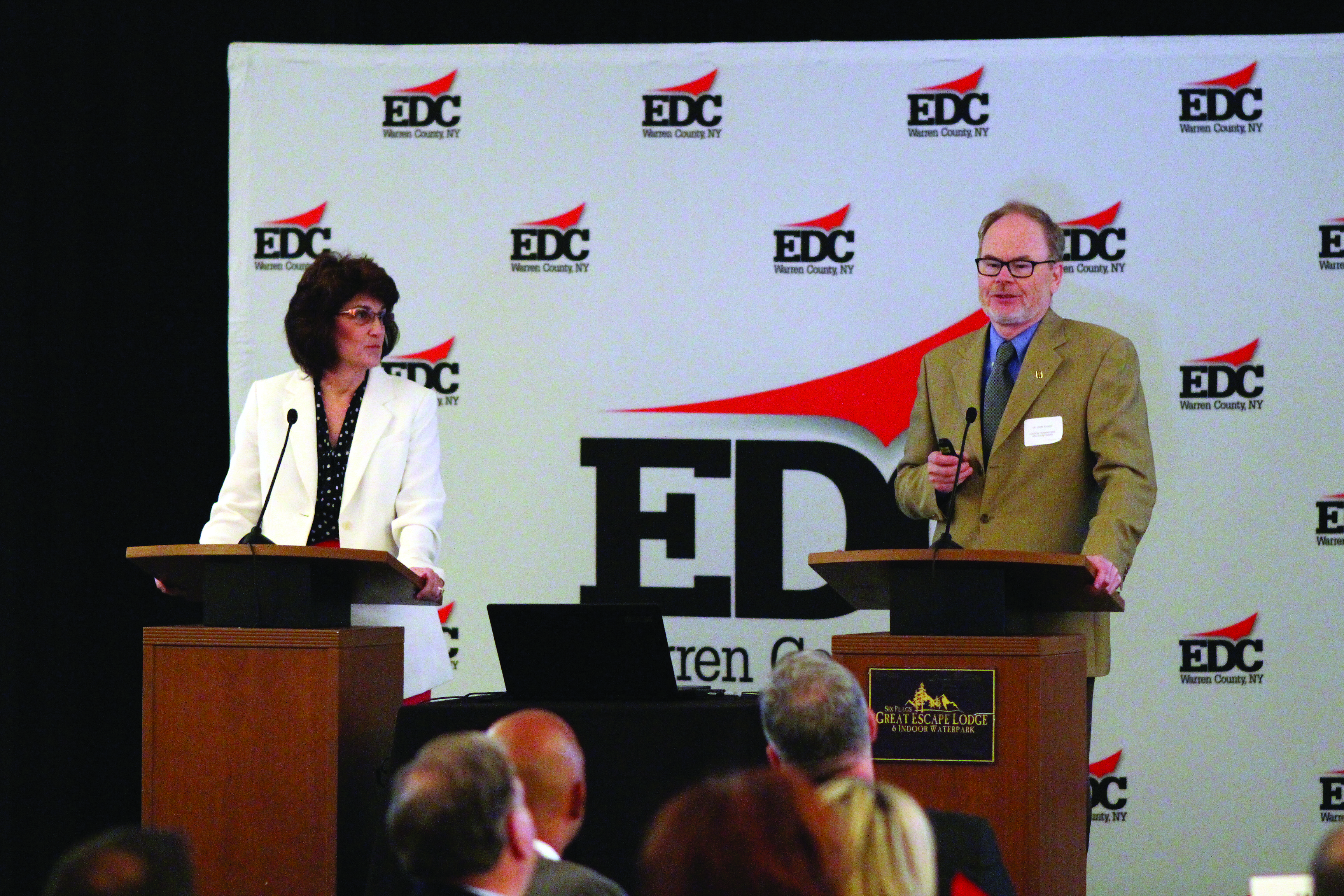
BY ANDREA PALMER
A major collaborative effort between
Glens Falls Hospital and Hudson Headwaters
Health Network, in conjunction the
Adirondack Health Institute (AHI), was
announced at the Economic Development
Corp. Warren County annual luncheon on
May 8 at the Great Escape Lodge.
The announcement involves AHI, founded
in 2011 and comprised of four corporate
owners: Glens Falls Hospital, Hudson Headwaters
Health Network, Adirondack Health
in Saranac Lake and UVM Health Network-
Champlain Valley Physicians Hospital. The
network includes approximately 100 provider
facilities and 1,400 partners in an 11,000
square mile area that covers nine counties.
Keynote speakers Dianne Shugrue, president
and CEO of Glens Falls Hospital, and
Dr. John Rugge, founding CEO of Hudson
Headwaters Health Network, said AHI will
share in $186.7 million in federal funding,
through the state, to redesign the health care
system to stabilize costs. Officials did not say how much of that funding will go through
AHI for the collaborative efforts between the
hospital and Hudson Headwaters.
The funding is to be used over five years.
The money will assist health care providers
meet the state’s goal of reducing unnecessary
emergency room visits and hospital stays
among Medicaid patients by 25 percent.
The state Medicaid system is changing
from a model based on fees for each service
to one where providers are paid a set fee,
with incentive payments for meeting quality
standards.
Shugrue cited increases in healthcare
costs grossly disproportionate to increases
in workers’ earnings as a need for an interdependent
collaboration between the two
facilities. The trickle-down result of the disparity
between healthcare costs and workers’
wages is a local economy negatively impacted
as a result of limited consumer spending.
“Many of the economic problems we are
having in this country can be traced to many of the economic problems we are having
within the healthcare system. Our current
system of delivery, quality and access to
healthcare, is simply unsustainable,” Shugrue
stated.
Healthcare costs account for 18 percent
of the entire U.S. economy and have grown
exponentially faster than the rate of inflation
since 1980, she said.
Rugge cited enormous financial pressure
on hospitals, primary care physicians and
specialists in areas of demand destruction,
disappearing margins and consolidation.
Rugge stated a need for value-based payments
for the consumer.
“Healthcare in the United States is simply
not a good value. Patients are facing high
costs and mediocre outcomes. Reimbursement
for providers has to change. We need to
move from fee-for-service medicine towards
paying for the value of the outcome of the
service provided,” he said.
Shugrue and Rugge noted recent cooperative
efforts between Glens Falls Hospital
and Hudson Headwaters Health Network,
including palliative care, physician recruitment,
the new health center in Warrensburg,
laboratory services, graduate medical education
planning and a 340B drug program for
oncology patients.
“There are many consistencies throughout
our two healthcare agencies. We complement
each other. Bottom line: We both exist to
deliver health care to this community, to the
same patients. We are both concerned about
access to healthcare, rising costs and quality
of care being delivered. We are both challenged
with redesign related to healthcare reform. It is imperative that we work together
to figure out how to transform healthcare
for the patients that we both serve, to make
this community strong and to make sure we
have world class healthcare available in our
region. We need to work together to do that,”
Shugrue said.
Rugge said the region depends on the
hospital for referral-based services and Hudson
Headwaters for primary care. “Together,
we can combine the care that our patients
receive. It is indeed a working marriage.”
“Hudson Headwaters is looking to be the
primary care foundation for this region,” he
said. “Glens Falls Hospital will provide the
most comprehensive hospital-based services
available. We will continue to be the center
of health care in this economic center of the
region and we hope to be a leading model
for the rest of New York state. In addition
to the healthcare we are providing, we can
share the responsibility in the economic
vitality and success of this community. If
we don’t have the support of our community,
representatives and businesses, we have no
future–and vice versa.”
Edward Bartholomew, president and CEO
of EDC Warren County, said the healthcare
system in the region “provides jobs to over
3,500 employees, with millions of dollars
being driven into the local economy through
salaries and benefits. Every hospital job
supports two more jobs, and every hospital
dollar spent supports two more dollars spent
in additional business activity. That collaboration
is here with Glens Falls Hospital and
Hudson Headwaters. They are both vibrant
and important parts of our economy.”
Photo Courtesy of Warren County EDC
